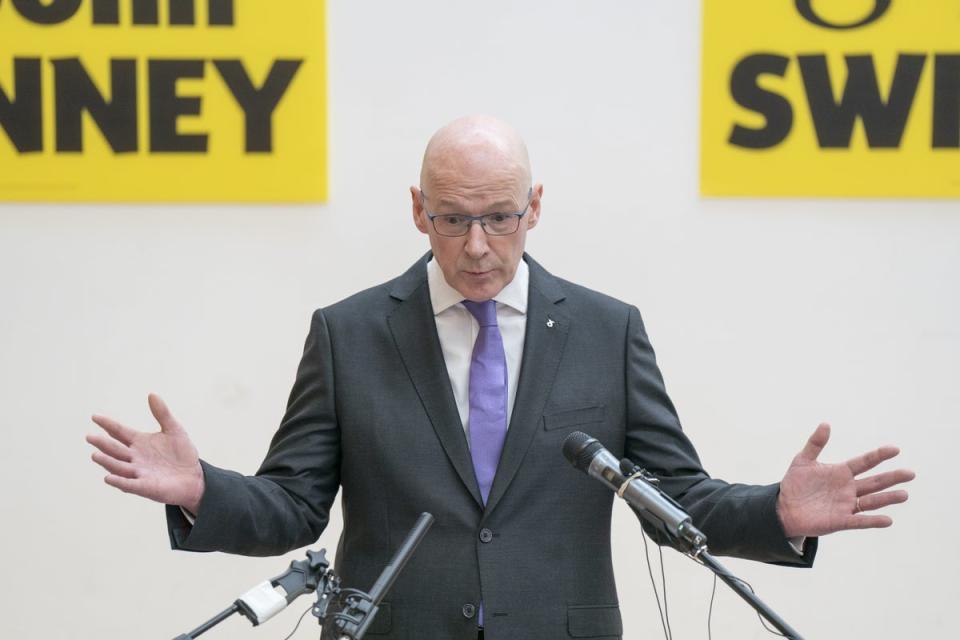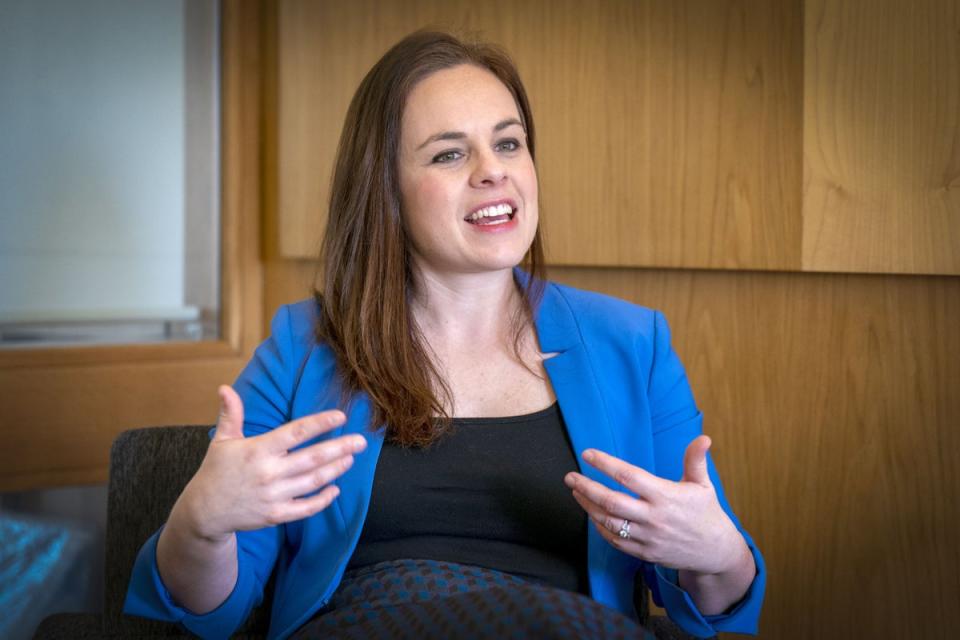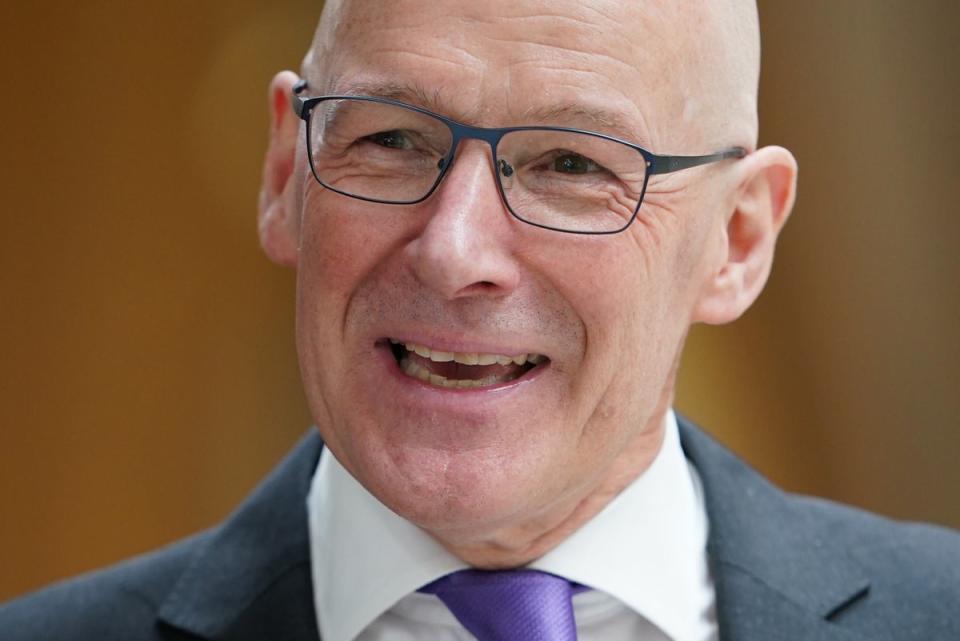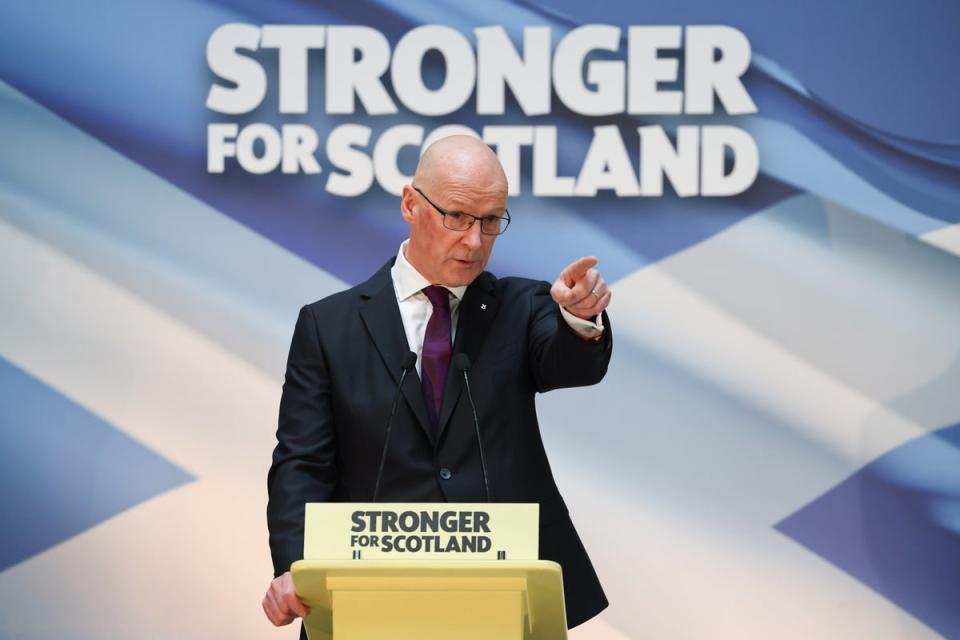John Swinney becomes SNP leader and Scottish first minister in waiting
John Swinney promised a “new chapter” as he took over as SNP leader on Monday after potential leadership contest rivals pulled out of the race.
The former deputy first minister was the only person to put himself forward to succeed Humza Yousaf, who is expected to formally step down this week.
Mr Swinney will still face a confirmation vote at Holyrood, which will likely see him approved as the Scottish parliament’s nominated candidate to be the seventh first minister.
In his acceptance speech, Mr Swinney paid tribute to the “grace and dignity” of Mr Yousaf, who he said showed “moral leadership on the issue of Gaza”.

He said he was not motivated by personal ambition but that he had stood for leader “out of a profound sense of duty” to his party and his country.
And, in a plea for unity in the party, Mr Swinney said: “If elected first minister, my focus will be the economy, jobs, the cost of living. It will be the NHS, our schools and our public services. It will be addressing the climate crisis.
“Do not let our disagreements dominate. Join me as we open a new chapter. That’s my job, that’s our job, and I plan to get the job done.”
I am deeply honoured to have been elected as Leader of @theSNP. I will give all that I have to serve my Party and my Country.
— John Swinney (@JohnSwinney) May 6, 2024
It comes just a week after Mr Yousaf announced he was stepping down as both SNP leader and Scottish First Minister, after his decision to tear up his party’s powersharing deal with the Greens at Holyrood left him facing a vote of confidence.
Former leadership rival Kate Forbes was seen as the most likely challenger to Mr Swinney, but ruled herself out last week.
In a tweet thread posted on social media site X, Ms Forbes said: “I have listened very carefully to the vision John Swinney set out this morning for Scotland. I welcomed, and embrace, his commitment to ensure internal respect for robust and divergent debate in the party, which is the lifeblood of any democratic institution like the SNP.”

SNP activist Graeme McCormick also ended his bid to become the next leader of the party.
Mr McCormick, who had made a last-minute bid for the leadership, said he would “not proceed” with his nomination and would instead support Mr Swinney.
He said he had met the thresholds to stand under party rules, but after “a lengthy and fruitful conversation” he decided to support Mr Swinney.
The SNP, which has lurched from crisis to crisis since Nicola Sturgeon announced she was quitting as leader last February, was desperate to avoid a drawn-out leadership contest.
The last poll, to replace Ms Sturgeon, saw Mr Yousaf, Ms Forbes and contender Ash Regan publicly trading blows and exposed deep divisions within the party.
Mr Swinney, one of the original intake of the Scottish Parliament in 1999, is seen by many as being able to provide calm leadership at what is a time of political turmoil for Scotland’s governing party.
He previously served as finance secretary under Alex Salmond when the SNP took power in 2007.

He served in the role for the entirety of Mr Salmond's tenure, before being appointed deputy first minister by Nicola Sturgeon when she took over.
Over the following nine years, the Perthshire North MSP occupied several ministerial offices in the Scottish government, including as education secretary, Covid-19 recovery secretary and again in finance, taking over that brief from Ms Forbes while she was on maternity leave.
During his time as Ms Sturgeon's deputy, he cemented his reputation as a dogged defender of his boss, as well as an SNP stalwart.
Scottish Green co-leader Patrick Harvie said the party’s seven MSPs would meet to discuss how they would vote in the ballot for first minister.
Mr Harvie stated: “We are committed to delivering on our vision of a fairer, greener and more equal Scotland, and are open to talks with John Swinney and his team about how we can work together to make that happen.”
He added: “Scotland needs a period of stable government. Mr Swinney knows that if he is to have our support then it must be on the basis of progressive policies that help us to tackle the climate crisis and build a fairer and more equal future.”
The Green MSP added: “There are a lot of important policies already on their way to delivery as a result of the Bute House Agreement, including better rights for tenants and rent controls, transforming the way we heat our homes and a watertight ban on conversion therapy.
“We remain utterly committed to these policies and will oppose any move away from them or steps to dilute them.”
Scottish Conservative leader Douglas Ross meanwhile urged Mr Swinney to “govern for all of Scotland by abandoning his relentless push for independence”.

Mr Ross insisted his party would seek to “hold John Swinney to account when he lets the Scottish people down, just as we’ve done with Humza Yousaf”.
But the Conservative added: “It’s difficult to see how he can be the fresh start Scotland needs, when he’s the ultimate continuity candidate.
“John Swinney was joined at the hip with the disgraced Nicola Sturgeon and his fingerprints are all over her numerous policy failures and cover-ups.”
With Mr Swinney having led the SNP previously between 2000 and 2004, Mr Ross went on to question if a “failed former leader from two decades ago, who, as education secretary, sent Scotland plummeting down international league tables” was the best person to lead the country.
He said: “With John Swinney at the helm, the SNP will double down on their independence obsession – the one issue they agree on – and ignore the real priorities of the Scottish people, such as fixing our ailing public services and growing the economy.”


